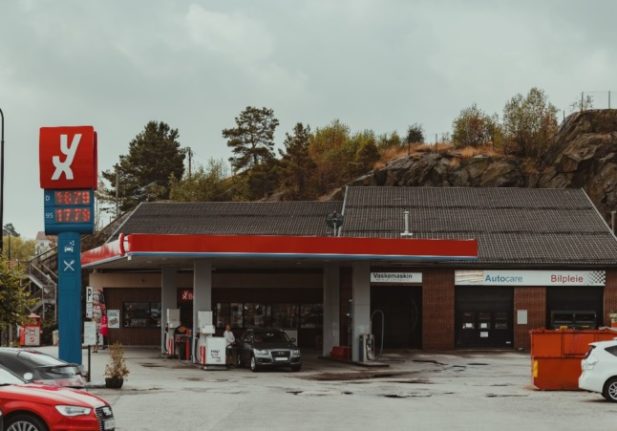Why is it so expensive to fuel up?
Fuel – gasoline, petrol and diesel — is an expensive monthly bill for many. Norway typically has some of the highest fuel prices in Europe. The at-times sky high prices are mainly due to taxes on fuel imposed by the government, as well as the usual international market factors.
The Norwegian Competition Authority or Konkurransetilsynet recently stated that it is perhaps now more important than ever before to be aware of the ever changing fuel prices.
“We have registered price differences of 2-3 kroner in the same local area. There is undoubtedly money to be saved by following along,” said Marita Skjæveland, deputy leader of the Norwegian Competition Authority’s energy section to broadcaster TV2.
The average price to fuel up between the months of July to October this year was 18.8 kroner per litre (2.26 dollars or 1.94 euros).
READ ALSO: Five things that are becoming more expensive in Norway (and why)
Does it matter which day you fuel up?
As of writing, routinely fueling your vehicle on a specific day of the week will likely no longer save you money.
“We see that the players in the market still raise prices two to three times a week, but that it happens on different days from week to week,” Skjæveland told TV2. The competition analyst added that by the end of the year, fixed price increases may also happen over the weekend. As such, it’s important to stay updated not only on the weekdays, but on the weekends as well.
Previously, Sunday evenings and early on Monday mornings used to be known as the cheapest time to fill your vehicle’s tank with petrol or diesel. This is now a practice of the past.
Where can I find cheap petrol prices online?
Hunting for the cheapest fuel prices in Norway is quite common. It’s also a normal discussion to have with your neighbours and colleagues. So don’t be worried about appearing ‘cheap’ if you want to talk about the high price of fuel. Or share which local petrol stations you have noticed to be less expensive.
You can check Facebook for groups that are committed to informing the public on where to find the cheapest petrol stations.
For Oslo and its surrounding areas, you can try here, and if you live in or are driving through the south of Norway, check here.
Drivestoff is an app designed to compare prices of petrol stations you will drive by on your journey so you can plan ahead to get the cheapest fuel. You can find more information and download the app here.
You can also save money by looking for a queue of cars at a petrol station. Yes, it may be just busy. But oftentimes, a queue is a signal for cheaper petrol prices.
Memberships and credit cards can save you money on fuel
If you’re in the market for a credit card, look for one that might save you money on fuel. Credit cards such as 365 Direct and Flexi VISA will give you good discount options at all petrol stations. If you have a particular station you always fill up at, such as a YX, you can sign up for the company’s credit card to receive discounts on fuel.
There are also benefits to be had if you sign up for a credit card or a drivstoffkort or “fuel card”.
A drivstoffkort is a special credit card which you use to pay when refuelling your vehicle. The cards generally only work at the stations run by the company to which the card belongs. Different deals and types of card are available, depending on the company.
Specific deals on credit card and drivstoffkort discounts can be found (in Norwegian) here.
You can sometimes use membership cards with grocery stores or real estate organisations to give you discounts on fuel. For example, the Coop Medlemskort will save you 45 øre when filling up at Circle K petrol stations. Trumf kortet, which is associated with the chains Kiwi, Meny, Joker and Spar, gives you bonuses when you fill up at Shell stations. OBOS members receive a 27 øre discount on petrol and diesel at both Statoil and 1-2-3-Automat stations.
Where can I get the lowest priced petrol?
Petrol stations in Norway are extremely competitive. There is no one company that is known to sell gasoline or diesel cheaper than the others.
Like many other goods, fuel prices around Norway will rise and fall with demand. Typically, fuel stations located in mountainous towns or areas that heavily rely on tourism will have more expensive fuel. If you’re on holiday in such a town or area, and can wait to fuel up when you get to a more trafficked motorway, it will likely save you money.
Petrol stations that don’t have employees on location tend to be slower at increasing their prices to match the competition. So if you know you’ll be passing by an ubemannet or “unstaffed” petrol station on your trip, it may be cost-effective to wait and fill up there.
Consider how much time you want to invest
Joining the hunt for cheaper fuel may not be for everyone. It is time consuming, and admittedly hard to achieve due to the ever-changing prices. If you are not dependent on your vehicle for your daily commute and don’t often drive long distances, fueling up at your local gas station may be the best choice.



 Please whitelist us to continue reading.
Please whitelist us to continue reading.
Member comments